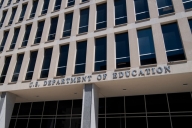You have /5 articles left.
Sign up for a free account or log in.
Well, you can't say that Sen. Lamar Alexander isn't an equal opportunity irritant to his successors as U.S. education secretary. Alexander, a Tennessee Republican who headed the federal agency during the first Bush administration, won the eternal gratitude of many college leaders by stopping Education Secretary Margaret Spellings dead in her tracks two years ago when she tried to use the federal regulatory process to bring about major changes in higher education accreditation. (Alexander argued that Spellings was trying to work around Congress, and helped pass legislation to make sure she couldn't; the secretary wasn't pleased.) On Wednesday, he took to the Senate floor to criticize Spellings' successor, Arne Duncan, on roughly similar grounds. He was unhappy that Duncan had sent a letter this week urging college presidents to get their campuses ready for a possible switch to the government's direct student loan program, even though Congress has yet to pass -- and the Senate has yet to consider -- legislation that would mandate such a switch, by ending lending through the bank-based Federal Family Education Loan Program. "The secretary's gotten a little ahead of himself," Alexander said, adding that the "Washington takeover" of the loan program -- he's not a fan of President Obama's proposal -- requires Congressional approval because "we have more than one branch of government in this town." He urged the administration to stop trying to ram through legislation that would force thousands of colleges to switch loan programs by July 1, which could result, Alexander said, in a "14 million car pileup on the interstate highways of American education," envisioning students unable to get loans because of administrative disarray in the government-run program. Administration officials have repeatedly said that colleges have found it much easier to switch loan programs than critics allege, and that they are intent on making changes that will pour tens of billions of dollars more into student aid programs.





